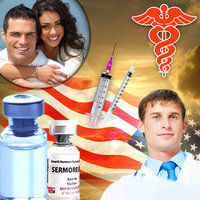Can adult-onset HGH deficiency strike during childhood?
 No, adult-onset growth hormone deficiency (AGHD) is a condition that occurs in adulthood, typically after the completion of normal growth during puberty. It is not a condition that can strike during childhood. Growth hormone deficiency (GHD) in children is a distinct condition and is referred to as pediatric growth hormone deficiency or childhood-onset growth hormone deficiency.
No, adult-onset growth hormone deficiency (AGHD) is a condition that occurs in adulthood, typically after the completion of normal growth during puberty. It is not a condition that can strike during childhood. Growth hormone deficiency (GHD) in children is a distinct condition and is referred to as pediatric growth hormone deficiency or childhood-onset growth hormone deficiency.
Childhood-onset growth hormone deficiency occurs when a child's pituitary gland does not produce enough growth hormone, which can lead to stunted growth and developmental issues. It is typically diagnosed and treated during childhood or adolescence to help children achieve normal growth.
On the other hand, AGHD occurs when there is a deficiency of growth hormone in adults who have already reached their full height and completed their growth phase. AGHD can result from various causes, such as pituitary tumors, head trauma, or the natural aging process, but it is typically not something that manifests during childhood.
 It's important to distinguish between these two conditions because the diagnosis, treatment, and management of pediatric GHD and AGHD are different due to the different developmental stages and growth needs of children and adults. This is why our specialist clinic takes only patients who are 30 or older. If you have concerns about growth hormone deficiency as an adult, it's best to consult with the doctors at our clinic – who are all board certified in this field – for a proper evaluation and guidance on appropriate testing and treatment.
It's important to distinguish between these two conditions because the diagnosis, treatment, and management of pediatric GHD and AGHD are different due to the different developmental stages and growth needs of children and adults. This is why our specialist clinic takes only patients who are 30 or older. If you have concerns about growth hormone deficiency as an adult, it's best to consult with the doctors at our clinic – who are all board certified in this field – for a proper evaluation and guidance on appropriate testing and treatment.
Could a child who had pediatric HGH deficiency later also develop adult-onset HGH deficiency?
 It is possible for a child who had pediatric growth hormone deficiency (GHD) to continue to experience growth hormone-related issues as they transition into adulthood, potentially leading to adult-onset growth hormone deficiency (AGHD). However, this scenario is relatively uncommon and depends on several factors.
It is possible for a child who had pediatric growth hormone deficiency (GHD) to continue to experience growth hormone-related issues as they transition into adulthood, potentially leading to adult-onset growth hormone deficiency (AGHD). However, this scenario is relatively uncommon and depends on several factors.
Here's how it can happen:
- Persistent GHD: Some individuals with childhood-onset GHD may continue to have inadequate growth hormone production as they enter adulthood. This can be due to various reasons, including ongoing pituitary gland dysfunction or the presence of other medical conditions that affect hormone production.
- Natural Aging: As people age, there can be a natural decline in growth hormone production, even in individuals without a history of childhood GHD. This age-related decline in growth hormone secretion can sometimes be excessive in certain people, and lead to the development of AGHD in adults.
- Secondary Causes: Certain medical conditions or treatments that are related to or unrelated to GHD during childhood may increase the risk of developing AGHD in adulthood. For example, radiation therapy or surgery to treat pituitary tumors can affect growth hormone production and potentially lead to AGHD later in life.
- Genetic Factors: Some individuals may have underlying genetic factors that make them more susceptible to both childhood GHD and AGHD.
It's important to note that the transition from pediatric GHD to AGHD is not the norm. Many individuals with pediatric GHD experience significant improvement in growth and overall health with appropriate treatment during childhood, and their growth hormone production may stabilize or normalize as they grow into adulthood.
 If someone with a history of childhood GHD is experiencing symptoms that suggest AGHD in adulthood, it's essential for him or her to consult with the endocrinologists at our clinic who specialize in hormone-related disorders in adulthood. Comprehensive evaluation and testing will be necessary to determine the cause of the symptoms and whether the patient has developed AGHD or if there are other factors at play. Treatment options can vary depending on the specific diagnosis and underlying causes.
If someone with a history of childhood GHD is experiencing symptoms that suggest AGHD in adulthood, it's essential for him or her to consult with the endocrinologists at our clinic who specialize in hormone-related disorders in adulthood. Comprehensive evaluation and testing will be necessary to determine the cause of the symptoms and whether the patient has developed AGHD or if there are other factors at play. Treatment options can vary depending on the specific diagnosis and underlying causes.
Contact Us For A Fast And Professional Response

- Comprehensive Therapy Regimen Shown to Reverse Symptoms of Early Alzheimer's and Cognitive Decline [Last Updated On: March 6th, 2025] [Originally Added On: February 27th, 2021]
- Weekly Therapy for Adult Growth Hormone Deficiency Approved by FDA [Last Updated On: January 15th, 2025] [Originally Added On: March 26th, 2021]
- Hormone Replacement Therapy – a Bad Rap? [Last Updated On: January 16th, 2025] [Originally Added On: August 16th, 2021]
- Seven Traits Associated with Good Health and Longevity [Last Updated On: September 6th, 2024] [Originally Added On: September 7th, 2021]
- Why Do I Have Growth Hormone Deficiency? [Last Updated On: January 15th, 2025] [Originally Added On: October 25th, 2021]
- Look Out For Those Hormone Scammers! [Last Updated On: January 19th, 2025] [Originally Added On: April 5th, 2022]
- My Millennial Transformation [Last Updated On: January 20th, 2025] [Originally Added On: June 5th, 2022]
- Running and Getting Nowhere [Last Updated On: January 27th, 2025] [Originally Added On: August 25th, 2022]
- Just Limited Exposure to New Anti-Aging Treatment Has Same Effect as Lifelong Treatments [Last Updated On: January 30th, 2025] [Originally Added On: September 4th, 2022]
- Having a Positive Outlook Can Make Your HGH Therapy Work Better [Last Updated On: December 27th, 2024] [Originally Added On: February 1st, 2023]
- My Friend Told Me to Ignore my Prescription and Double my HGH Intake – Is This a Good Idea? [Last Updated On: December 28th, 2024] [Originally Added On: March 17th, 2023]
- Self-Administering HGH Injections: Messy and Painful [Last Updated On: December 28th, 2024] [Originally Added On: March 23rd, 2023]
- Are You the Fourteenth Man? [Last Updated On: January 1st, 2025] [Originally Added On: March 30th, 2023]
- Should I Get My Hormone Levels Checked? [Last Updated On: December 29th, 2024] [Originally Added On: April 6th, 2023]
- HGH Causes Weight Loss [Last Updated On: January 2nd, 2025] [Originally Added On: April 12th, 2023]
- Will HGH Replacement Therapy Mess up the Balance of my Other Hormones? [Last Updated On: December 29th, 2024] [Originally Added On: April 21st, 2023]
- The Effects of Human Growth Hormone on Men's Confidence and Attractiveness [Last Updated On: January 2nd, 2025] [Originally Added On: April 28th, 2023]
- HGH Case Study: What Terrible Thing Happened to Jeff? [Last Updated On: January 5th, 2025] [Originally Added On: May 4th, 2023]
- The Effect of Radiation on Human Growth Hormone Levels [Last Updated On: February 5th, 2025] [Originally Added On: May 17th, 2023]
- Ibiza Club DJ Thought He’d Never Dance or Make Love Again [Last Updated On: February 5th, 2025] [Originally Added On: May 25th, 2023]
- What are the Mental and Psychological Effects of Adult-Onset HGH Deficiency? [Last Updated On: February 25th, 2025] [Originally Added On: September 28th, 2023]
- Potential Mental and Psychological Impacts of Adult-Onset HGH Deficiency [Last Updated On: February 11th, 2025] [Originally Added On: February 11th, 2025]
- Understanding Different Stages of Growth Hormone Deficiency [Last Updated On: February 12th, 2025] [Originally Added On: February 12th, 2025]
- Revolutionary Therapy Regimen Reverses Early Alzheimer’s Symptoms [Last Updated On: March 1st, 2025] [Originally Added On: March 1st, 2025]

















